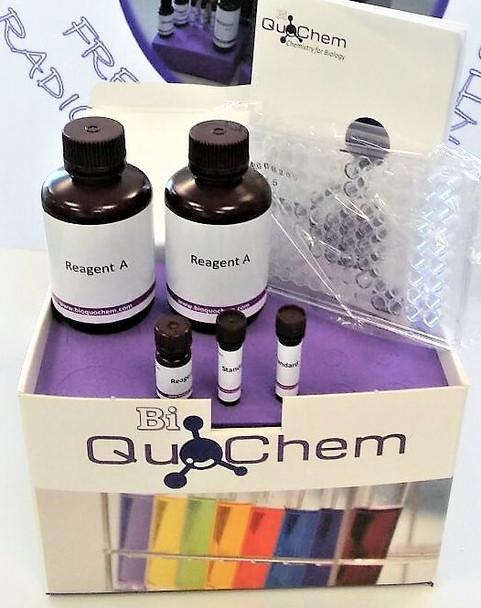Description
Please note that BioQuochem items have a $300 minimum. Please contact us if you have any questions.
DPPH assay measures the antioxidant activity of compounds that are able to transfer hydrogen atoms. The compound (DPPH•+) a coloured and stable radical cation of purple colour which shows a maximum of absorbance at 517 nm. Antioxidant compounds, which are able to transfer an electron to DMPD•+, cause a discolouration of the solution. This reaction israpid and proportional to the antioxidant capacity of the sample.

Total antioxidant capacity or TAC has been considered an overall parameter, which alterations have been linked to several conditions as infertility, obesity, cancer and neurodegenerative diseases.
BQC DPPH assay kit is an easy and highly reproducible assay to test TAC on single antioxidants in aqueous solutions, on food and beverages.
DPPH assay measures the antioxidant activity of compounds that are able to transfer hydrogen atoms. The compound (DPPH•+) a coloured and stable radical cation of purple colour which shows a maximum of absorbance at 517 nm. Antioxidant compounds, which are able to transfer an electron to DMPD•+, cause a discolouration of the solution. This reaction is rapid and proportional to the antioxidant capacity of the sample.
Antioxidant capacity is an overall ability of organisms or food to catch free radicals and prevent their harmful effect. Antioxidative effect includes protection of cells and cellular structures against the harmful effect of free radicals, especially oxygen and nitrogen. Substances with antioxidative properties are called antioxidants. They are contained in food and food supplements, most commonly in fruits, vegetables, rice, wine, meat, eggs, and another foodstuff of plant and animal origin.
Antioxidative systems include antioxidative enzymes, that is, superoxide dismutase, catalase, glutathione peroxidase, glutathione-S-transferase, and non-enzymatic substrates, such as glutathione, uric acid, lipoic acid, bilirubin, coenzyme Q, vitamin C (L-ascorbic acid), vitamin A (retinol), vitamin E (tocopherol), flavonoids, carotenoids, theine compounds in green tea, and others. Some biomolecules are also considered biologically active and clinically significant antioxidants, for example, transferrin, ferritin, lactoferrin, ceruloplasmin, hemopexin, haptoglobin, and uric acid.
Total antioxidant capacity or TAC has been considered an overall parameter, which alterations have been linked to several conditions as infertility, obesity, cancer and neurodegenerative diseases.
BQC DPPH assay kit is an easy and highly reproducible assay to test TAC on single antioxidants in aqueous solutions, on food and beverages.
Custom Assay Service Available! Please contact us for more information.


